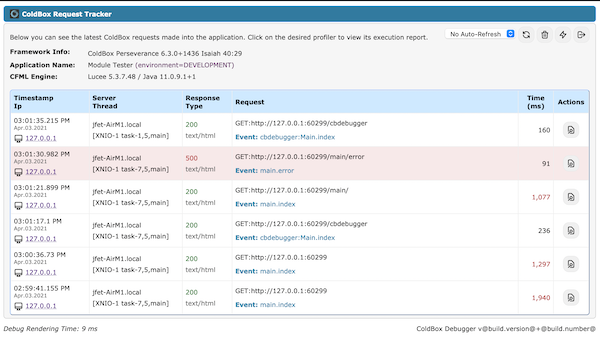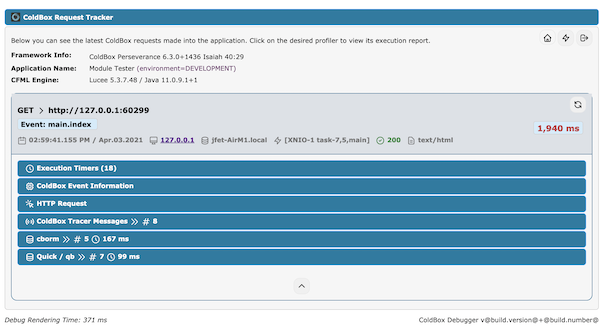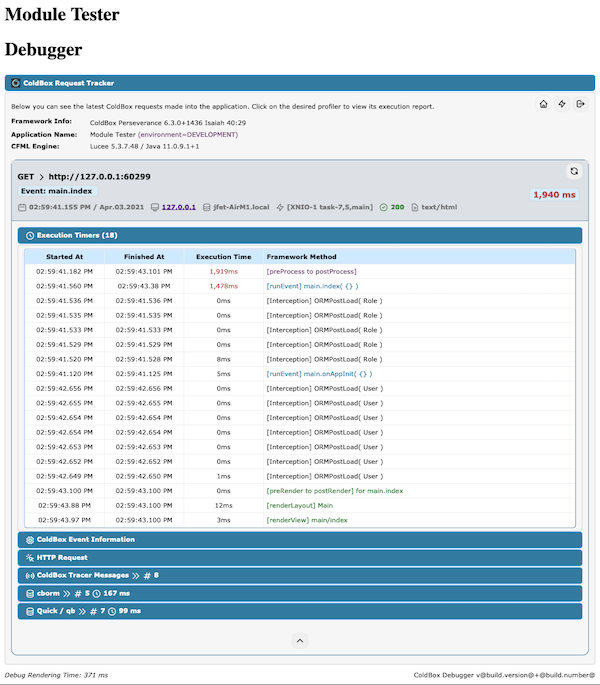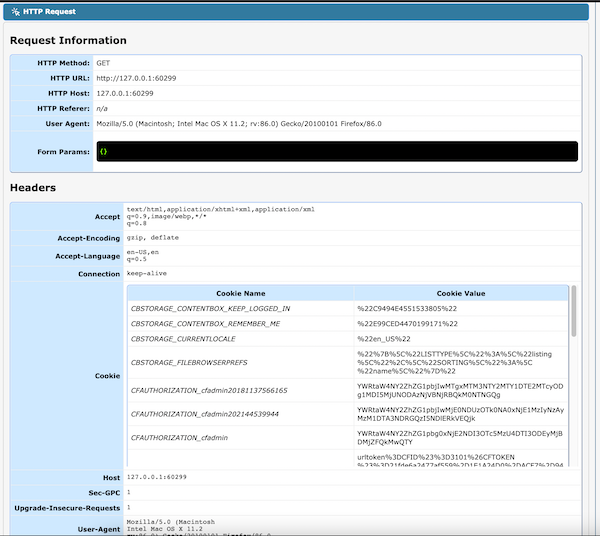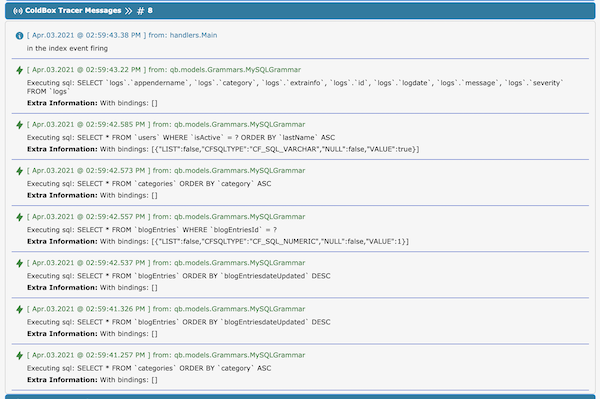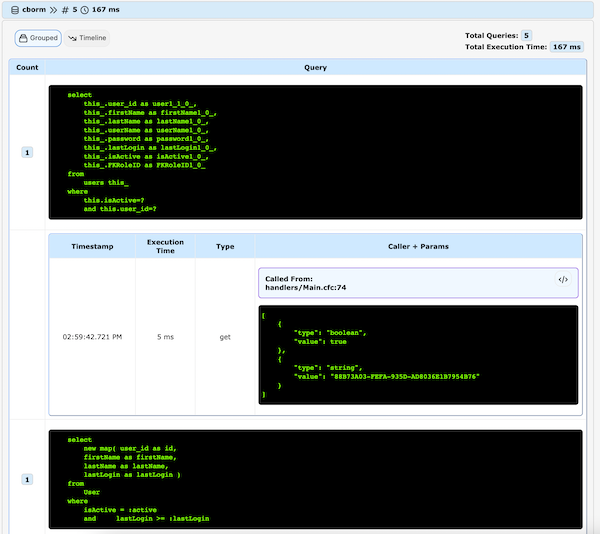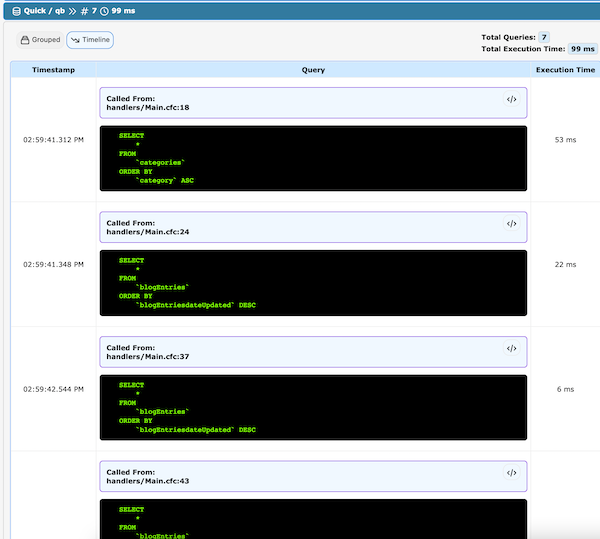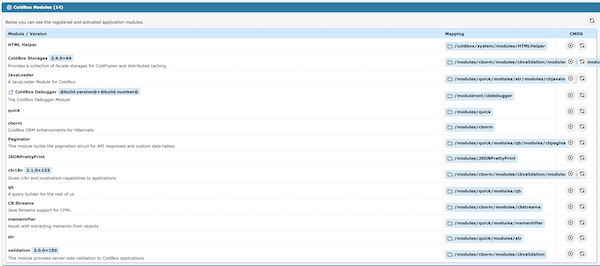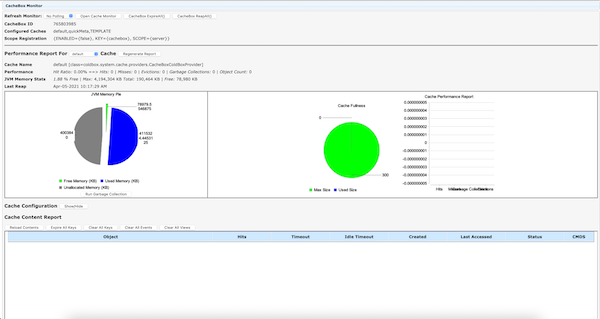Welcome To The ColdBox Debugger Module
The ColdBox Debugger module is a light-weigth performance monitor and profiling tool for ColdBox applications. It can generate a nice debugging panel on every rendered page or a dedicated visualizer to make your ColdBox application development nicer, funer and greater! Yes, funer is a word!
Debugger Request Visualizer
Request Tracker Collapsed
License
Apache License, Version 2.0.
Important Links
- Source: https://github.com/coldbox-modules/cbox-debugger
- ForgeBox: https://www.forgebox.io/view/cbdebugger
- Community: https://community.ortussolutions.com/c/box-modules/cbdebugger/38
- Issues: https://ortussolutions.atlassian.net/browse/CBDEBUGGER
- Changelog
System Requirements
- Lucee 5+
- ColdFusion 2016+
- ColdBox 6+
Instructions
Just drop into your modules folder or use CommandBox to install
box install cbdebugger
This will activate the debugger in your application and render out at the end of a request or by visiting the debugger request tracker visualizer at /cbdebugger.
Capabilities
The ColdBox debugger is a light-weigth performance monitor and profiler for your ColdBox applications. It tracks your requests, whether Ajax, traditional or REST, it's environment, execution and much more. Here is a listing of some of the capabilities you get with the ColdBox Debugger:
- Track all incoming requests to your applications in memory or offloaded cache
- Track exceptions and execution environment
- Track incoming http requests, parameters, body and much more
- Track final request collections
- Track Hibernate and
cbormqueries, criteria queries and session stats - Track
qbandquickqueries, entities and stats - Tap into LogBox via our Tracer messages and discover logging on a per request basis
- Profile execution and results of ANY model object
- Profile execution of ANY ColdBox interception point
- Custom Timer helpers for adding timing methods and annotations anywhere in -our code
- Profile your production or development apps with ease
- Track ColdBox modules and lifecycles
- Highly configurable
- Highly extensible
Settings
The debugger is highly configurable and we have tons of settings to assist you in your development adventures and also in your performance tuning adventures. Please note that the more collectors you active, the slower your application can become. By default we have pre-selected defaults which add neglible performance to your applications.
Open your config/coldbox.cfc configuration object and add into the moduleSettings the cbDebugger key with the following options:
moduleSettings = {
// Debugger Settings
cbDebugger = {
// Master switch to enable/disable request tracking into storage facilities.
enabled : true,
// Turn the debugger UI on/off by default. You can always enable it via the URL using your debug password
// Please note that this is not the same as the master switch above
// The debug mode can be false and the debugger will still collect request tracking
debugMode : true,
// The URL password to use to activate it on demand
debugPassword : "cb:null",
// Request Tracker Options
requestTracker : {
// Track all cbdebugger events, by default this is off, turn on, when actually profiling yourself :) How Meta!
trackDebuggerEvents : false,
// Store the request profilers in heap memory or in cachebox, default is cachebox
storage : "cachebox",
// Which cache region to store the profilers in
cacheName : "template",
// Expand by default the tracker panel or not
expanded : true,
// Slow request threshold in milliseconds, if execution time is above it, we mark those transactions as red
slowExecutionThreshold : 1000,
// How many tracking profilers to keep in stack: Default is to monitor the last 20 requests
maxProfilers : 50,
// If enabled, the debugger will monitor the creation time of CFC objects via WireBox
profileWireBoxObjectCreation : false,
// Profile model objects annotated with the `profile` annotation
profileObjects : false,
// If enabled, will trace the results of any methods that are being profiled
traceObjectResults : false,
// Profile Custom or Core interception points
profileInterceptions : false,
// By default all interception events are excluded, you must include what you want to profile
includedInterceptions : [],
// Control the execution timers
executionTimers : {
expanded : true,
// Slow transaction timers in milliseconds, if execution time of the timer is above it, we mark it
slowTimerThreshold : 250
},
// Control the coldbox info reporting
coldboxInfo : { expanded : false },
// Control the http request reporting
httpRequest : {
expanded : false,
// If enabled, we will profile HTTP Body content, disabled by default as it contains lots of data
profileHTTPBody : false
}
},
// ColdBox Tracer Appender Messages
tracers : { enabled : true, expanded : false },
// Request Collections Reporting
collections : {
// Enable tracking
enabled : false,
// Expanded panel or not
expanded : false,
// How many rows to dump for object collections
maxQueryRows : 50,
// Max number to use when dumping objects via the top argument
maxDumpTop: 5
},
// CacheBox Reporting
cachebox : { enabled : false, expanded : false },
// Modules Reporting
modules : { enabled : false, expanded : false },
// Quick and QB Reporting
qb : {
enabled : true,
expanded : false,
// Log the binding parameters
logParams : true
},
// cborm Reporting
cborm : {
enabled : true,
expanded : false,
// Log the binding parameters (requires CBORM 3.2.0+)
logParams : true
},
// Async Manager Reporting
async : {
enabled : true,
expanded : false
}
}
}WireBox Mappings
The module will also register the following model objects for you:
debuggerService@cbdebuggertimer@cbdebugger
The DebuggerService can be used a-la-carte for your debugging purposes.
The Timer object will allow you to time code execution and send the results to the debugger panel.
Helper Mixins
This module will also register a few methods in all your handlers/interceptors/layouts and views. You can use them for turning the debugger panel on/off, timing code execution and much more.
/**
* Method to turn on the rendering of the debug panel on a request
*/
any function showDebugger()
/**
* Method to turn off the rendering of the debug panel on a request
*/
any function hideDebugger()
/**
* See if the debugger will be rendering or not
*/
boolean function isDebuggerRendering()
/**
* Start a timer with a tracking label
*
* @label The tracking label to register
*
* @return A unique tracking hash you must use to stop the timer
*/
function startCBTimer( required label )
/**
* End a code timer with a tracking hash. If the tracking hash is not tracked we ignore it
*
* @labelHash The timer label hash to stop
*/
function stopCBTimer( required labelHash )
/**
* Time the execution of the passed closure that we will execution for you
*
* @label The label to use as a timer label
* @closure The target to execute and time
*/
function cbTimeIt( required label, required closure )
/**
* Shortcut to get a reference to the ColdBox Debugger Service
*/
function getCBDebugger()
/**
* Push a new tracer into the debugger. This comes from LogBox, so we follow
* the same patterns
*
* @message The message to trace
* @severity The severity of the message
* @category The tracking category the message came from
* @timestamp The timestamp of the message
* @extraInfo Extra info to store in the tracer
*/
DebuggerService function cbTracer(
required message,
severity = "info",
category = "",
timestamp = now(),
extraInfo = ""
)Debugger Events
The debugger also announces several events that you can listen to and extend the debuging and profiling capabilities:
// Before the debugger panel is rendered
"beforeDebuggerPanel",
// After the last debugger panel is rendered
"afterDebuggerPanel",
// Before any individual profiler report panels are rendered
"beforeProfilerReportPanels",
// After any individual profiler report panels are rendered
"afterProfilerReportPanels",
// When the request tracker has been created and placed in request scope
"onDebuggerRequestTrackerCreation",
// Before the request tracker is saved in the profiler, last chance to influence the recording
"onDebuggerProfilerRecording"Profiling Objects
The ColdBox debugger allows you to profile the execution of ANY method in ANY CFC via our AOP pointcuts. All you need to do is add the profile annotation to a method or component declaration in your model/orm objects. Once you do, the debugger will track the execution of those methods in the debug timers panel for you. First thing to do is make sure the setting is turned on:
requestTracker : {
// Profile model objects annotated with the `profile` annotation
profileObjects : true,
// If enabled, will trace the results of any methods that are being profiled
traceObjectResults : false,
}The traceObjectResults if true will track the actual results of the method calls into your debugger timer panel. Careful, as we will serialize anything you send to us. Then add the profile annotation to any method or cfc.
/**
* Profile all methods in this component
*/
component profile{
}
// Add the profile to this method to track it
function saveAllObjects() profile{
}Profiling objects is great because you can just annotate and forget. Nothing to turn off in production.
WireBox Object Creation Profiling
There will be cases where you need to test the performance of the creation of certain objects in WireBox. YOu can do so by activating the profileWireBoxObjectCreation setting in the requestTracker. Once enabled, you will see the profiling of all objects created by WireBox in the debug timers.
Profiling Interceptions
Debug Timers
In an event-driven framework like ColdBox, there are tons of events that fire within traditional request/response transactions. You can activate our tracker and we will trace and profile interception calls. Activate it via the settings first:
// Profile Custom or Core interception points
profileInterceptions : true,
// By default all interception events are excluded, you must include what you want to profile
includedInterceptions : [ "onUserSave", "ORMPostLoad" ],Once activated, you can add a collection of interception points to profile in your application. We will track them for you and even if they are ORM calls we will tell you which entity initiated the call.
HTTP Request Tracking
HTTP Visualizer
The debugger will track all incoming http calls into your application. It will show you all the relevant method, query string, form params, headers, and even the HTTP Body (if enabled). By default, the HTTP Body is ignored as it can be big and tracking it on every request can reduce performance. However, you can easily turn it on and inspect the incoming packets.
requestTracker = {
// Control the http request reporting
httpRequest : {
expanded : false,
// If enabled, we will profile HTTP Body content, disabled by default as it contains lots of data
profileHTTPBody : true
}
}ColdBox Tracers
ColdBox Tracers
The debugger also ships with a LogBox appender we call the ColdBox Tracer. This tracer will absorb the usage of log info(), fatal(), error(), warn(), debug() calls within your application and group them to the request that they initiated from. You can then visualize and inspect them in your debugger. All you have to do is activate it and enjoy!
// ColdBox Tracer Appender Messages
tracers : { enabled : true, expanded : false },Please note that by default the tracer appender will log any logging level from fatal to debug to your request tracker and will track anything sent to it. So also note that this can have an impact on performance if you are sending tons of complex objects to the extraInfo argument. With much power, comes much responsibility!
Hibernate + cborm
Grouped cborm calls
We have a dedicated panel in the debugger that will track all criteria queries and executeQuery() calls from within your application. It will show you a grouped or a timeline visualizer of all these sql calls. All you have to do is activate it:
// cborm Reporting
cborm : {
enabled : true,
expanded : false,
// Log the binding parameters (requires CBORM 3.2.0+)
logParams : true
}You can also enable logParams and we will track the original executable parameters of the query so you can debug the actual values of these executions. We will also track from WHERE in the application the sql execution came from and you can even open the file to that specific line number using our code editor integrations by clicking our open in editor buttons.
Note: CBDebugger's
cborm.logParamssetting requires CBORM 3.2.0 or higher.
The grouped view you see above will give you an aggregate look of all the sql calls made during the request and their frequency of execution. It will also give you a mini report of those specific sql groups with data about where the query originated from in your source code and the binding parameters, if activated.
Timeline cborm calls
The timeline view gives you a track of all the sql requests made via cborm from start to finish in your request.
qb/Quick
qb/quick calls
We have also created a qb and quick panel which will track all SQL calls made via qb or via quick during your request. We offer the same grouped or timeline visualizer for all these sql calls and even the capability to track from where the calls where made from and open them in your favorite editor to the line number. All you have to do is activate it:
// Quick and QB Reporting
qb : {
enabled : true,
expanded : false,
// Log the binding parameters
logParams : true
},Also remember that you can activate the bidining parameters to the sql calls.
Modules Panel
Modules Tracker
If enabled, we will track also the loaded modules in your application:
// Modules Reporting
modules : { enabled : true, expanded : false },From the panel you will be able to analyze the registration and activation of all your application modules. You can even reload, unload and execute life-cycle commands against them.
CacheBox Monitor
CacheBox Monitor
You can also enable the CacheBox monitor and get complete insight into all your registered application caches.
// CacheBox Reporting
cachebox : { enabled : true, expanded : false },Debugger Visualizer
Debugger Visualizer
A part from debugging the incoming request and presenting the debugger at the end of the request, you can also navigate to /cbdebugger and visualize the Debugger request tracker. This panel will monitor ALL incoming requests to your application: rest, soap, ajax, etc.
You can execute several commands from this visualizer:
- Clear all request history
- Reinit ColdBox
- Shutdown the debugger visualizer
- Refresh the requests
- Auto refresh the requests
You can then select a specific request and open the request report with all the tracked information.
Please note that the request tracker in the debugger has a configurable capacity for requests. By default we track the last 25 requests into the application. You can either increase it or reduce it to your hearts content. Just note that the more you track, the more memory it consumes.
// How many tracking profilers to keep in stack: Default is to monitor the last 20 requests
maxProfilers : 25,Copyright Since 2005 ColdBox Framework by Luis Majano and Ortus Solutions, Corp www.coldbox.org | www.luismajano.com | www.ortussolutions.com
HONOR GOES TO GOD ABOVE ALL
Because of His grace, this project exists. If you don't like this, then don't read it, its not for you.
"Therefore being justified by faith, we have peace with God through our Lord Jesus Christ: By whom also we have access by faith into this grace wherein we stand, and rejoice in hope of the glory of God. And not only so, but we glory in tribulations also: knowing that tribulation worketh patience; And patience, experience; and experience, hope: And hope maketh not ashamed; because the love of God is shed abroad in our hearts by the Holy Ghost which is given unto us. ." Romans 5:5
THE DAILY BREAD
"I am the way, and the truth, and the life; no one comes to the Father, but by me (JESUS)" Jn 14:1-12
